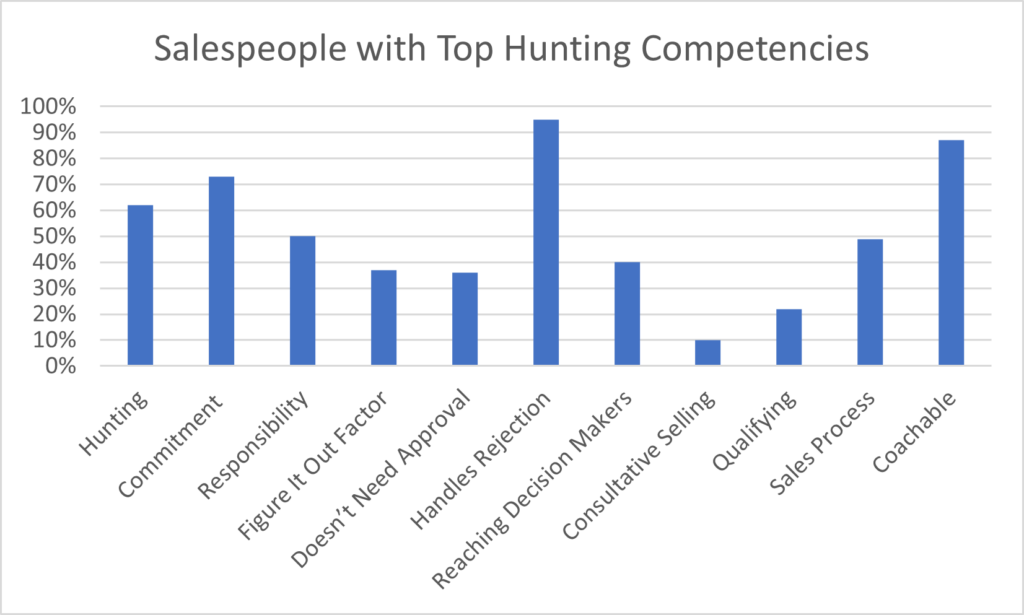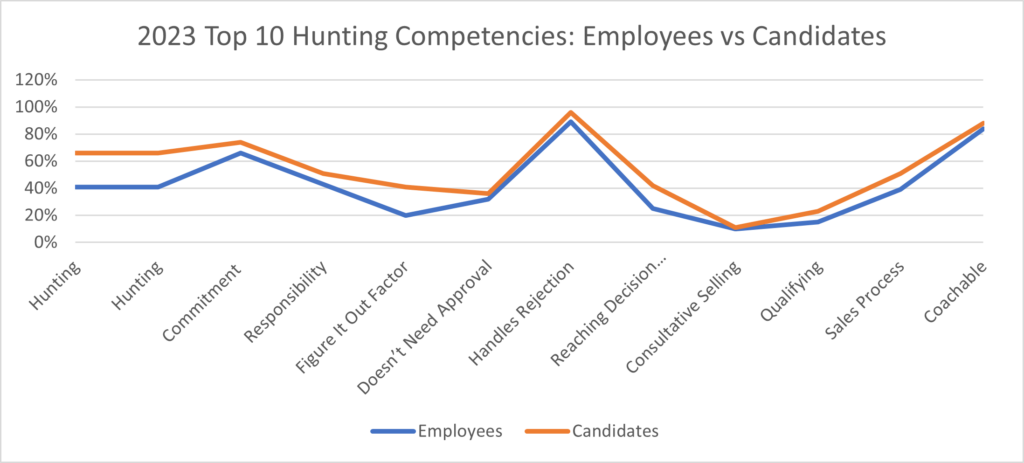Your pipeline is looking thin. The sales process is longer than last year. Prospects ghost your sales team. Your business is missing key targets. You’re trying to figure out how to achieve your sales goals faster and you’re beginning to doubt that your sales rep has the hunter sales skills you thought. Is it your salesperson, or is it the 2023 market?
It’s probably a little of both.
Having started my sales career as an accountant, I know sales is not an art. It can be learned. But before it can be learned, you need to know what your sales team must do, and be able to do, in the current market to drive more new business. Even with COVID and the shift in how to cold call and reach people, it was different than what we’re experiencing today.
- The 2023 Sales Situation
- Buying Process Changes Impact Hunting Success
- What the 2023 Sales Situation Means for Cold Calling Skills
- The Top 10 Sales Hunting Skills
- Percent of Salespeople With Top Hunting Competencies
- Are Your Sales Reps Better at Hunting Than New Sales Reps You Can Hire?
- Can You Train Hunter Sales Skills or Should You Hire Instead?
- What To Do First To Improve Hunter Sales Skills
- Find Out if Your Can Team Hunt
The 2023 Sales Situation
Rising interest rates and the war in Ukraine continue to impact the world economic outlook. We’re experiencing high US inflation rates. These facts are impacting how companies are making buying decisions.
Even if you’re running a small business, your sales reps are feeling the effect as they attempt to get in the door with new prospects. Here’s the sales situation your new business development salespeople are encountering.
Buying Process Changes Impact Hunting Success
Organizations have tightened their budgets and their purse strings.
Not everyone is willing to invest right now. That means when your team is prospecting, contacts may not be as receptive.
With tighter budgets, there is a lot of pricing pressure.
Once you get access and you’re in the sales process, companies are asking, “How might I phase that service in? Can you bring the price down?” Now, during prospecting, when a sales hunter connects with a decision maker, “How much will it cost?” comes up more frequently than it has in the past.
The buying process has gotten more complex and decision making has moved upward.
Whenever the market becomes unstable or uncertain, companies move decision making higher within the organization. They get more people involved. With less budget available, buying decisions feel riskier. Companies want to be confident in the decision they are making. They prefer to buy from vendors they already know. Decision makers aren’t as interested in speaking with salespeople from organizations they aren’t familiar with.
Slower approval process
With the added complexity, executive-level decision making, and more people involved, final approvals take longer. Fewer decisions are being made. There is less need to speak with salespeople about new projects or services.
What the 2023 Sales Situation Means for Cold Calling Skills
As a result, you have unresponsive prospects who could be ghosting your sales team, and that makes it more challenging for them to gain access.
Knowing all of this, you have to think about: What cold calling skills and other prospecting skills
does our team need? It’s not enough to ask yourself, Can they get past the gatekeeper? Are they going to cold call? Do they have a good value proposition? Do they know how to grab the attention of their target market?
Those cold call skills are still important, but there are even more skills that are critical this year that had not been in the past.
The Top 10 Sales Hunting Skills
1. Hunting
These are the foundation prospecting skills in sales that you think of when someone says “sales hunter” to you. Is the salesperson going to prospect consistently? Do they know how to cold call? Are they getting meetings with the target prospects that we want them to reach? Are they maintaining a full pipeline?
2. Handling rejection
Whether they are cold calling, emailing, reaching out on LinkedIn, dropping by, or even calling referrals, hunting is tough right now. Are they recovering from the rejection that they’re encountering more frequently and consistently from prospects? Your sales rep can’t allow the increased rejection to keep them from cold calling.
3. Do not need approval
Your salesperson can’t worry about having a gatekeeper or decision maker agree with everything they say. While you don’t want your rep to antagonize prospects, you do want them to be able to have authentic conversations with contacts. They have to be able to ask tough questions and make tough recommendations as appropriate.
4. Commitment and responsibility
Commitment means that you’ve got salespeople who are committed to doing whatever it takes, within legal reason, to be successful. Responsibility means that when things aren’t going their way, they’re taking responsibility for their own success. They’re not making excuses for why their prospecting activities aren’t successful. They’re looking internally first to determine what they could do differently to improve their results. There are many excuses that could be made right now, but you don’t want to hear them without suggestions. You want a salesperson who is committed to finding ways around this year’s challenges.
5. Figure it out factor
This is a salesperson’s capability to absorb and apply the coaching that you are providing to develop them. If we’re training them to get them past their need for approval and how they’ll handle rejection, are they going to be able to quickly adopt and apply what was shared with them?
6. Reaching the decision makers
In hunting, reaching decision makers is about gaining access. The salesperson should be calling at the decision-maker level and reaching them to have executive-level conversations. In 2023 it’s especially important that your salesperson is calling at the top. That’s where they’ll hear the initiatives a company is focused on.
7. Qualify
Based on what they learned when they spoke with the decision maker, the rep can qualify if there is a real opportunity right now, next quarter, or next year. With longer sell cycles, maintaining a pipeline of 3 times your quota isn’t enough this year. You’ve got to have 5-to-7 times your pipeline based on the market you’re selling to. You want a salesperson who is holding great conversations and, in the process, qualifying if now is the time to begin working together, or if they need to wait till next quarter to talk again.
8. Consultative Selling
Because the market is the way that it is and prospects aren’t as receptive to having conversations with people they don’t know, consultative selling is an important aspect of hunting this year. It’s not always as critical, although I really like to see it in hunters. Consultative selling allows your salesperson to have a different level of conversation with decision makers. They build trust through conversations that leave prospects eager to work together. When you begin hunting from a consultative sales perspective, it shifts the entire sales process.
9. Sales process
This is important for new business development right now, because cold calling is even more challenging than usual. Reps can’t give up. They must be diligent. You hire a salesperson expecting they are going to bring their sales process knowledge with them, or you hire 5 salespeople and expect them to know how to hunt. But that’s not generally the case. 51% of sales reps are not strong at following sales process. Your salesperson must follow a consistent process like the Bloodhound Follow-up Strategy and adhere to it diligently to get in the door with new prospects.
10. Coachable
Your salesperson shouldn’t face the selling challenges in today’s market alone. They need coaching to switch up their prospecting approach. The value proposition they used last year is not the one that will get them in the door this year. If all they were doing was cold calling in the last few years, that’s not going to cut it. They may have to shift their target markets. They need guidance, which means they have to be coachable and open to new strategies and approaches.
Foundation Hunter Sales Skills for Every Year
There are foundation hunting and prospecting skills for sales that you want on staff in any year. For example, you always want whoever is doing your new business development to be able to hunt. You always want reps to be able to reach decision makers, not need approval, and be comfortable discussing money.
Regardless of shifts in their target markets or the world, top-performing sales hunters will always use these skills. Look for them on your staff and in potential new hires.
Percent of Salespeople With Top Hunting Competencies
We did an analysis of all salespeople and sales hiring candidates assessed by Objective Management Group since January. We wanted to look at very current skill results to determine how many are strong in the hunting competencies required in the current selling environment.
Of more than 19,000 salespeople, 62% are strong in hunting. However, only 37% have a strong Figure It Out Factor that will allow them to implement coaching to adjust their sales approach.
Here’s how salespeople scored for each of the top 10 sales-hunting skills necessary to find new leads and set first appointments in 2023.

Are Your Sales Reps Better at Hunting Than New Sales Reps You Can Hire?
Here’s what’s interesting as I looked at this. When we analyzed employees and candidates separately using the same Objective Management Group data, in almost every skill area, sales candidates outperformed the employed sales reps.

Does that mean that your employees just aren’t good at cold calling and prospecting? Should you fire your salespeople and replace them? You’re going to find better candidates? Not necessarily.
What it means is that once somebody joins your staff, you may not be continuing to train them. You may have a rep who has been there for a long period of time, and you haven’t been developing them or pushing them to use their prospecting skills for sales. As a result, your salesperson’s hunting skills aren’t progressing. Rather, they’re actually losing skills.
These are important statistics for you to recognize, because it shows you that your staff most likely need cold call training and sales coaching to develop their hunting and prospecting skills.
It’s not a lack of sales hunting potential with your salesperson. It’s that they need development.
Can You Train Hunter Sales Skills or Should You Hire Instead?
If you are a sales leader or a business owner, you’re looking at the scores for the top 10 hunter sales skills and thinking that many are low. While 62% of all salespeople who completed a sales assessment have hunting skills, only 22% are strong in qualifying. Only 40% reach decision makers. Just 10% sell consultatively. 50% won’t take responsibility for their own success.
The question becomes, “Do I train, or do I hire?” There is a simple equation to help you determine the best path for your organization.
The Hire or Train Equation
1. If the salesperson has potential and you can afford the time to train, then train them. Consider How To Cold Call training or Sales Coaching like we offer, where your rep receives training and coaching is tailored to them. They will learn how to prospect, navigating the current environment.
2. If the salesperson has little potential, then you need to hire one who already possesses the top sales hunting skills. This may feel daunting, especially if you haven’t been successful hiring sales roles in the past. Consider our Sales Hiring Coaching where we guide you, step by step, through how to find, attract, hire, and onboard top sales talent.
3. If you have a salesperson who has potential, but doesn’t have capacity to do new business development, then you need to hire or redistribute the work. You can’t pile on more.
What if a Salesperson Isn’t Improving After Training?
When a salesperson’s hunting and prospecting isn’t improving, even after training, they probably have a low figure-it-out factor. They learn more slowly and need repetition. They need to try what they’ve learned, get some more coaching, adjust, and try some more.
This isn’t bad. It’s a fact and something you want to be aware of. Once you know, you can determine the right development plan for your rep.
However, it is especially difficult for business owners who don’t have extra time to devote to coaching a salesperson. A sales rep with a low figure-it-out factor may be able to learn, but they need consistent reinforcement over time. Go back to the Hire or Train Equation and determine if you want to hang in there with this salesperson, or if you need to hire.
What if a Salesperson Won’t Take Responsibility for Their Hunting Success?
In new business development, it’s important that your salesperson takes responsibility for their own success. Cold calling, LinkedIn messaging, and email prospecting are all tough in the current environment.
There are some industries that are very successful and are buying right now, but there are a lot that are not. And because there are those that are not buying, even in the industries that are making investments, they’re watching those companies who are not buying. They’re rethinking, “Should I be investing? Should I not be investing? Let’s see what next quarter is going to bring.” We hear a lot of that. As all these thoughts go through prospects’ minds, contacts are less willing to talk with sales reps they don’t know. They’re not sure they want to make any type of investment, so why respond to a salesperson?
Combine the 2023 situation with salespeople who don’t take responsibility for their own success. Now they have more excuses. They’re now not doing everything they could be doing to generate new business. Instead, they’re blaming the economy, interest rates, summer vacation, price changes, and more.
There’s always an excuse.
You don’t want that. This is where management is so important. As the sales manager, you have to help your salespeople take responsibility. In new business development, especially, it’s critical that reps take responsibility, always tweaking what they’re doing to improve their sales performance.
If your salesperson isn’t taking responsibility, even after management and coaching, look at their coaching score.
Are they coachable? If not, you probably have your answer. If they are coachable, go back to the Hire or Train Equation to determine if you should invest in more coaching, or if you need to hire.
What To Do First To Improve Hunter Sales Skills
Begin by pinpointing what your salesperson or team’s hunter sales skills are today. This is not a year to play around and try and guess if they can or can’t hunt. You want to know their sales hunting competencies now. With that information you can put an action plan in place to address their gaps.
3 Steps To Get Started
1. Determine your salesperson’s hunter sales competencies.
2. Identify your rep’s skill gaps.
3. Create an action plan to address their gaps.
Conduct a Sales Assessment Before You Begin
You now know the 10 hunter sales skills you need on your team to find new opportunities, fill your sales pipeline, and generate new business in this current environment. Either you’re going to develop the salesperson or team you have, or you’re going to hire a rep with sales hunting skills.
I strongly recommend you conduct a sales assessment of your salesperson to guide how you’re going to proceed. If you’re hiring, I equally strongly recommend you assess all potential sales candidates.
I cannot stress this enough. Assess!
What You Want To Learn From an Assessment
The information you learn by doing a sales assessment of a salesperson is invaluable.
Here’s what you want to learn:
- When you are hiring, you assess candidates carefully to know, “Am I getting a salesperson who truly can hunt or not.” Consider how much training you are willing to invest in for a new hire after the initial onboarding.
- If you have the resources to invest in a new hire salesperson, coach them, hold them accountable, and manage them. You can hire someone who has potential, but not all the necessary hunting skills yet.
- If continual skill development, coaching, and sales management are not possible, you must hire a higher-performing salesperson or they’ll fail.
- For your existing sales reps, your goal is to determine where they would benefit from development, coaching, and motivation to reach their full potential as hunters.
Find Out if Your Can Team Hunt
Hunting, prospecting, new business development – whichever way you describe it in your business – is tough this year. These skills are a core element of your sales team and critical to building a successful revenue generation system. Without them, your pipeline shrinks. Client attrition has an even greater impact. Running your business becomes painful.
If you are uncertain about your salesperson or sales team’s hunting skills, don’t hesitate. Contact us and let’s schedule a time to talk about how you can develop the hunting ability your business deserves.




